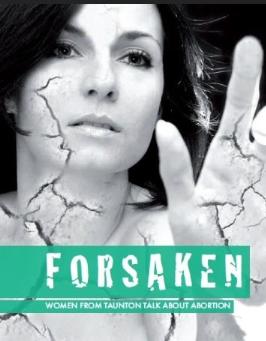A couple of weeks ago I blogged about Forsaken, a charity offering abortion counselling in Taunton; the charity has published a book, also called Forsaken, which was referenced by Nadine Dorries in a recent Parliamentary debate:
…I shall finish by mentioning a book which is to be launched this month. It is published by the charity Forsaken, which is neither pro-life nor pro-choice: it is pro-women. For two years, the charity has put together the stories of women suffering from post-abortion syndrome. Reading the book is so heart-wrenching that we just want to reach out and take their pain away, but we cannot. There is no going back. We cannot make it better; abortion is a procedure to end life-it is final.
Having seen the book, there is no way that it can be described as “neither pro-life nor pro-choice” – it is blatantly anti-abortion, with two very obvious aims: (a) to make women contemplating abortion feel that they shouldn’t do it; and (b) to persuade women who have had abortions to convert to Christianity. The stories abound with sentences such as “As I prayed, I felt a weight lifted from me”… “I had a new calling in my life – God”… “My son is in the arms of God”… “God has forgiven me, that’s his promise to us all”… “Tears of joy rolled down my cheeks as I realised that they forgave me and so did Jesus”. Interspersed are poems, including one in which a fetus remarks on how the womb is “so wonderfully designed by my Creator”. There’s also a lengthy New Testament quote, from 1 Timothy 1:12-17:
I thank Christ Jesus our Lord, who has given me strength, that he considered me trustworthy, appointing me to his service. Even though I was once a blasphemer and a persecutor and a violent (wo) man, I was shown mercy because I acted in ignorance and unbelief. The grace of our Lord was poured out on me abundantly, along with the faith and love that are in Christ Jesus. Here is a trustworthy saying that deserves full acceptance: Christ Jesus came into the world to save sinners—of whom I am the worst. But for that very reason I was shown mercy so that in me, the worst of sinners, Christ Jesus might display his immense patience as an example for those who would believe in him and receive eternal life. Now to the King eternal, immortal, invisible, the only God, be honor and glory for ever and ever. Amen.
The book ends with some short Appendices, outlining “Post Abortion Syndrome” and supposed risks to physical health, and giving the contact details for Alternatives, a counselling service linked to the same church as Forsaken (the Living Light Christian Church, a local moderate Charismatic church).
There are also a few names: the back cover has an old quote from Dr Alfred Bongiovanni (misspelt as “Alfred Bongionni”) on how human life begins at conception, sourced to a book by Randy Alcorn entitled Why Pro-Life?, which might have given Dorries a bit of a clue. Alcorn runs Eternal Perspective Ministries; he has been involved with protests at abortion clinics and is associated with Operation Rescue. There is also a preface by Margaret Cuthill of the Abortion Recovery and Care Helpline; this was formerly British Victims of Abortion, and it was inspired by the National Right to Life Committee’s American Victims of Abortion following visits to the UK’s Society for the Protection of Unborn Children (SPUC) by the AVA’s Olivia Gans. According to an article by Ellie Lee, this was the conduit by which the idea of “Post Abortion Syndrome” came to the UK (1).
Tim Ireland has noted that the book was printed with the notice that Forsaken is a registered charity, but that the word “registered” has been Tippexed out. Dorries – who uses accusations of “harassment” to deflect any scrutiny – predictably threatened Tim with the police for “abusive behaviour ” after he contacted the organisation to enquire about its charitable status.
(1) See Ellie Lee (2001) “Reinventing Abortion as a Social Problem: ‘Postabortion Syndrome in the United States and Britain”, in Joel Best (ed.) How Claims Spread: Cross-National Diffusion of Social Problems (Walter De Gruyter: New York) pp. 39-67. On Google Books here.
Filed under: Uncategorized | 16 Comments »




